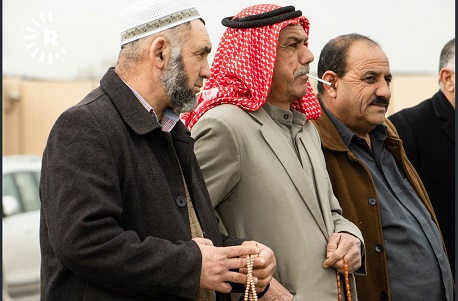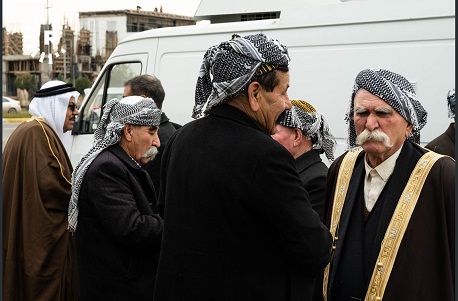
IDPs from Nineveh province protesting outside the UN's Erbil office on January 22, 2020. Photo: Bilind T. Abdallah
ERBIL, Kurdistan Region – Internally Displaced Persons (IDPs) from the disputed Nineveh province protested in front of the United Nation’s Erbil office on Wednesday against the presence of Shiite militias in their hometowns and villages.
Nineveh province was seized by the Islamic State (ISIS) in the summer of 2014. The province is mostly home to minority groups such as Christians, Yezidis and Shabaks, who were especially targeted by the terror group.
Iran-backed Popular Mobilization Forces (PMF, Hashd al-Shaabi in Arabic) assisted the Iraqi army in the 2016-2017 offensives to dislodge ISIS, which ruled the Nineveh capital of Mosul and its surrounding areas for over two years.
PMF units have remained in Nineveh ever since, and protesters say this is preventing them from going home.
“We in Nineveh plains are living with Kurdistan Region in peace, and have been living there for thousands of years, while now Hashd al-Shaabi prevent us from going back to our hometowns,” Bashar Aazam, an elderly Christian man from Tal Skof told Rudaw.
Haji Harki, a Kurd told Rudaw on Wednesday that “people are not going back to Nineveh province because they are afraid of Hashd al-Shaabi militias.”
“PMF asks for money or your family’s women and they don’t care about any other institution or police department in the province,” he added.

According to the International Organisation for Migration (IOM) there are at least 111,384 individuals from Nineveh currently displaced in Erbil province, while around 318,666 are living in Duhok.
Protester Amin Ahmed accused PMF Brigade 30 in particular of preventing IDP returns to Nineveh.
“There is a PMF unit called Brigade 30 that prevents Kurds, Shabaks, Kakais and Turkmens returning to their hometowns,” Ahmed said.
Brigade 30 is a unit primarily composed of ethnically Shabak residents of eastern Mosul.
The brigade has caused particular controversy, with leader Waad Qado, also known as Abu Jaafar al-Shabaki, sanctioned by the US Treasury Department for alleged corruption and human rights abuses on July 2019.
Qado’s brigade was accused of extracting money from residents of the mixed Christian-Shabak town of Bartella through extortion, illegal arrests and kidnappings.
“Members of the local population allege that the 30th Brigade has been responsible for egregious offenses including physical intimidation, extortion, robbery, kidnapping, and rape,” added a press release from the US Treasury.

Protesters then left the UN and headed to the Kurdistan Parliament to meet with the Kurdish and Disputed Areas committee to discuss the matter.
Jwan Younis, head of Kurdish and Disputed Areas in the parliament of Kurdistan region told Rudaw on Wednesday that PMF is enacting demographic change in the province.
“They [PMF] are working on demographic changes in the areas of Nineveh, and this is a very dangerous development,” Younis said.
“We will work with the Iraqi parliament regarding the request and demand of the people of Nineveh, also with the consulates of the foreign countries, as well as the United Nations,” he added.
Photos by Bilind T.Abdullah









Comments
Rudaw moderates all comments submitted on our website. We welcome comments which are relevant to the article and encourage further discussion about the issues that matter to you. We also welcome constructive criticism about Rudaw.
To be approved for publication, however, your comments must meet our community guidelines.
We will not tolerate the following: profanity, threats, personal attacks, vulgarity, abuse (such as sexism, racism, homophobia or xenophobia), or commercial or personal promotion.
Comments that do not meet our guidelines will be rejected. Comments are not edited – they are either approved or rejected.
Post a comment